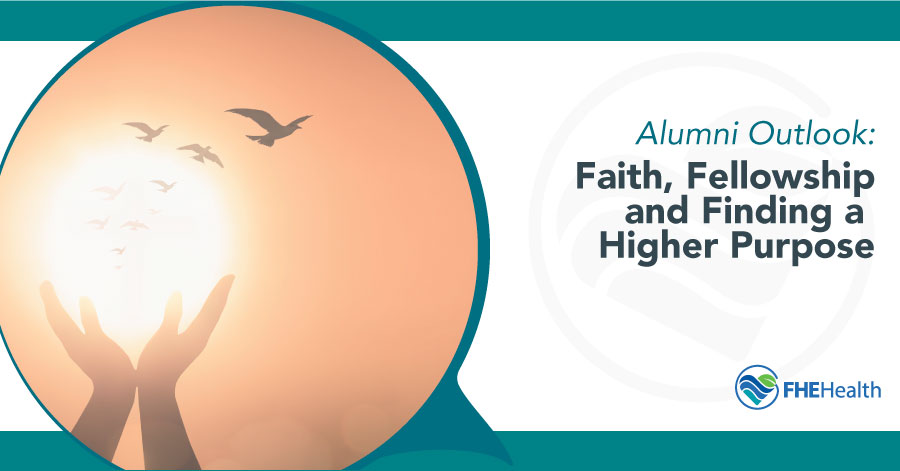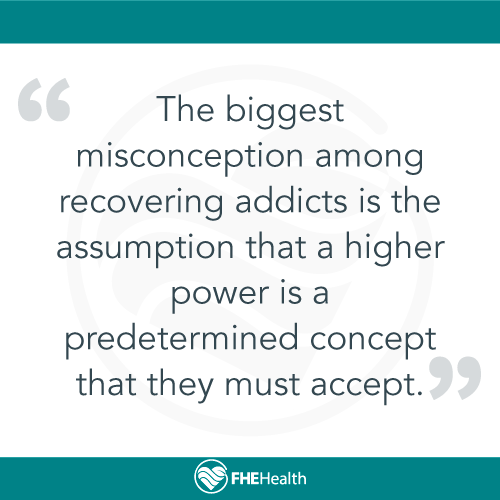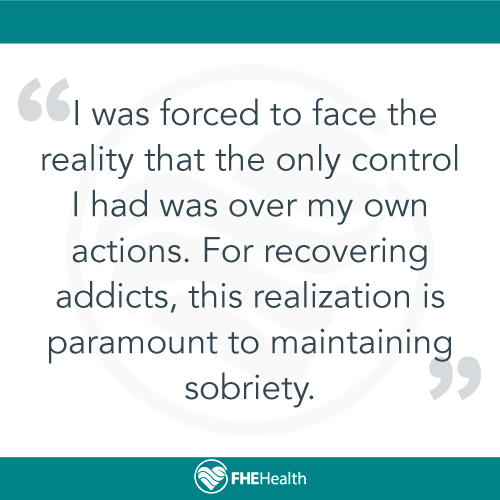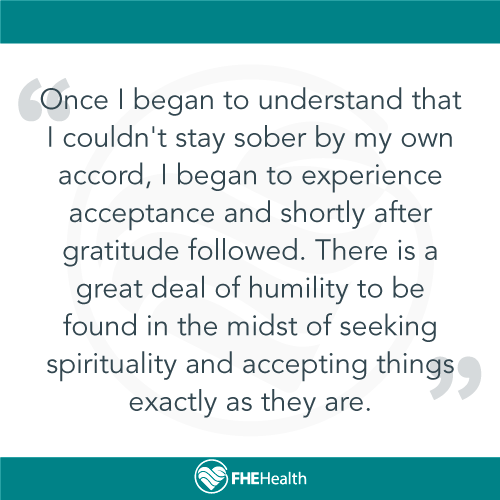
There is no question that spirituality is a vital component of recovery. However, the topic of religion and a Higher Power is most certainly a taboo for individuals struggling with addiction and recovery. I’ll speak for myself and say that when I first got sober, I was thoroughly convinced that I had fallen too far down the scale for God to want to have anything to do with me. Guilt and shame deepened the distance between me and the possibility of making any sort of spiritual connection.
Understanding My Higher Power
 I remember coming into recovery and being told, “Trust God. Clean house. Help others.” I had no problem with the last two directives in this catchy phrase, but I just couldn’t grab onto the first instruction. Honestly, my contempt led to a lot of emotional pain and self will run riot. Many people, myself included, enter a twelve-step program without any idea of what living by “spiritual principles” entails. For me, I was living only by principles that supported my addiction. The biggest misconception among recovering addicts is the assumption that a higher power is a predetermined concept that they must accept.
I remember coming into recovery and being told, “Trust God. Clean house. Help others.” I had no problem with the last two directives in this catchy phrase, but I just couldn’t grab onto the first instruction. Honestly, my contempt led to a lot of emotional pain and self will run riot. Many people, myself included, enter a twelve-step program without any idea of what living by “spiritual principles” entails. For me, I was living only by principles that supported my addiction. The biggest misconception among recovering addicts is the assumption that a higher power is a predetermined concept that they must accept.
I grew up in the Bible Belt and spent every Wednesday night and Sunday morning in church. In fact, my conception of God was spoon-fed to me by the pastor each and every week. I enjoyed the stories of hope and perhaps that was due to the utter disparity I was living in. However, my relationship with God was hot and cold – more often than I’d like to admit. I was the epitome of the Sunday worshiper. I lived my days by my own will and ventured to church on Sunday to repent of my sins in order to hopefully avoid punishment. Again, my motives were always driven by self.
A Higher Power Separate From Your Actions
 It’s no surprise that when I entered into a twelve-step fellowship, I was unable to conceptualize my own understanding of a higher power. I had come to know a God that loved me based on my behavior. Let’s just say my behaviors were less than favorable. Therefore, I spent years running from any sort of religion or spiritual connection during my addiction. My life was governed by self-will. I was living in guilt and shame and absolutely hopeless.
It’s no surprise that when I entered into a twelve-step fellowship, I was unable to conceptualize my own understanding of a higher power. I had come to know a God that loved me based on my behavior. Let’s just say my behaviors were less than favorable. Therefore, I spent years running from any sort of religion or spiritual connection during my addiction. My life was governed by self-will. I was living in guilt and shame and absolutely hopeless.
Self-will and control were an illusion that only existed in my own perception of reality. When I was challenged to grow spiritually and create my own conception of a higher power, my delusion of controlling the future was dismantled. I was forced to face the reality that the only control I had was over my own actions. For recovering addicts, this realization is paramount to maintaining sobriety. The truth is, everything else is completely out of my control. I came to realize I couldn’t control the people, places, and things around me.
Finding a Connection With a Higher Power
Once I began to “let go and let God,” I finally began to understand radical acceptance. I rebelled against this idea, perhaps out of fear. The more I relinquished control, relief followed, and life began to take on a whole new meaning. Not only was I no longer stressing the future, but I began to let go of the wreckage of my past. Twelve-step programs offer the opportunity to clean house and help others, but first, we have to learn to trust God – or good orderly direction.
In other words, I couldn’t participate in any of the directives of this new sober fellowship until I began to trust in a power greater than myself. Participation in recovery requires humility, honesty, service, love, forgiveness, and so many other spiritual principles that I was absolutely inept in applying to my life. I always viewed myself as a victim of circumstance and honestly, this perception fueled my addiction.
Discovering the Need for Spirituality
 Once I began to understand that I couldn’t stay sober by my own accord, I began to experience acceptance and shortly after gratitude followed. There is a great deal of humility to be found in the midst of seeking spirituality and accepting things exactly as they are. I became responsible for my actions and began examining my shortcomings. This process of self-evaluation required me to trust in a power greater than myself to restore me to sanity. I began trusting women again. I slowly let go of the incessant need to try and control everyone and everything around me. I began to surrender to the beautiful process of recovery while helping others along the way.
Once I began to understand that I couldn’t stay sober by my own accord, I began to experience acceptance and shortly after gratitude followed. There is a great deal of humility to be found in the midst of seeking spirituality and accepting things exactly as they are. I became responsible for my actions and began examining my shortcomings. This process of self-evaluation required me to trust in a power greater than myself to restore me to sanity. I began trusting women again. I slowly let go of the incessant need to try and control everyone and everything around me. I began to surrender to the beautiful process of recovery while helping others along the way.
Above all of the lessons I’ve learned in recovery and the blessings I‘ve experienced, the relationship I have with God today is by far the most valuable gift I’ve received. Even with almost four years sober, there are days when I am absolutely nuts. There are days when I still try to control my kids or my coworkers and instantly find myself wallowing in resentment and/or self-pity. Thankfully, the relationship I have with God and other spiritual women in my life, I am quickly right-sized by the reality that I am absolutely powerless over anything and everything other than myself. The same fellowship I found in the church, I found in the rooms of a twelve-step fellowship. There is no judgment, but rather love and acceptance in the room of the fellowship I am a part of today. I have so much gratitude for the spiritual progress I’ve made, and I know that I would not be sober today if it weren’t for the connection I have with my Higher Power.
Control is with a Higher Power
For addicts, living in self adds a ton of unnecessary pressure and stress. When we try to control the outcome of things, we often find that we have little success. Whatever is supposed to happen will happen – with or without our consent. Once we come to believe that there is a governing power behind everything, the burden of control is dismantled. Addiction is a disease of the mind, body, and spirit – rooted in selfishness and self-seeking. Surrendering the control of every situation’s results helps to free the mind and soul of an addict.The only solution for a spiritual malady is a spiritual experience.






